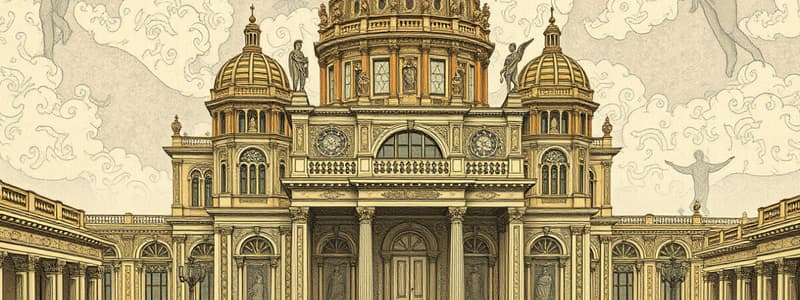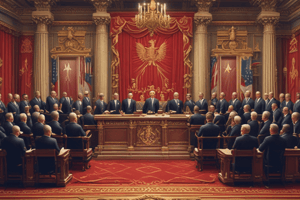Podcast
Questions and Answers
What is the primary characteristic of a theocracy?
What is the primary characteristic of a theocracy?
- A political structure operated by a monarch.
- A system in which a god is recognized as the ultimate authority. (correct)
- A government led by elected officials.
- A governance system focused on individual rights over collective beliefs.
Which statement best exemplifies the nature of theocratic governance?
Which statement best exemplifies the nature of theocratic governance?
- Religious leaders hold the highest political power. (correct)
- Rulers are chosen through popular vote among citizens.
- The state is entirely secular and separates religion from government.
- Legal decisions are made based solely on human reasoning.
In a theocracy, how is authority typically justified?
In a theocracy, how is authority typically justified?
- Through divine insight or mandate. (correct)
- By the will of the people through democratic elections.
- Based on a constitution that emphasizes secularism.
- By a military coup or forceful takeover.
What distinguishes a theocratic government from a dictatorship?
What distinguishes a theocratic government from a dictatorship?
Which of the following might be a consequence of establishing a theocracy?
Which of the following might be a consequence of establishing a theocracy?
Flashcards are hidden until you start studying
Study Notes
Primary Characteristics of Theocracy
- Theocracy is a form of government where religious leaders hold political power, and divine guidance is considered the supreme authority.
- Laws and policies are typically based on religious doctrine rather than secular statutes.
Nature of Theocratic Governance
- Governance is characterized by a close relationship between political authority and religious institutions.
- Decision-making often reflects religious beliefs and doctrines, prioritizing spiritual over temporal concerns.
Justification of Authority in Theocracy
- Authority in a theocracy is often justified through claims of divine right or mandate, suggesting that leaders are chosen or endorsed by a higher power.
- This justification can lead to the suppression of dissent, as questioning authority may be equated with questioning divine will.
Theocratic Government vs. Dictatorship
- Unlike dictatorships, where power is concentrated in one individual or a small group often based on force or coercion, a theocracy derives its authority from religious beliefs and institutions.
- Theocratic governance focuses on aligning government policies with religious principles, while dictatorships may prioritize secular power and control.
Consequences of Establishing a Theocracy
- Establishing a theocracy can lead to reduced religious freedom, as dissenting beliefs may be suppressed in favor of dominant religious practices.
- Theocratic rule may foster social division, particularly in diverse populations with multiple belief systems, leading to potential conflict.
Studying That Suits You
Use AI to generate personalized quizzes and flashcards to suit your learning preferences.




